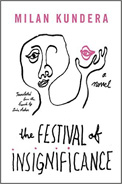
 |
The Festival of Insignificance
by Milan Kundera
Harper
With The Festival of insignificance, Milan Kundera completes a series of short philosophical treatises loosely shaped around a fictional narrative involving the life, and mostly thoughts, of characters converging on a cocktail party. The party is a fraud, as it is to honor a man who has faked his terminal illness. The internal monologues that dominate the narrative become a metaphor for the beauty of insignificance. Insignificance, asserts Kundera, has real value in life and love. It carries our attention and amounts to a life lived, while brilliance can be useless in everyday applications, shunned and feared by many, thereby alienating a soul. Indeed, much of life is pointless, and very few have the capacity to assert their will into concrete existence.
Kundera is the open narrator of his books, with regular interruptions and sidebars. He is very French now. No longer the Czechoslovakian, Cold War escapee, he writes in French, thinks in French—argues with the great philosophers in the French way—but he is still ever-fascinated with the motivations and machinations of the old Communist Party. A tangential aside within in this novella is the story of Stalin’s joke played upon his council. In the aftermath of the communist’s bloody reshaping of its people, Stalin's council doesn't get the joke because they no longer know how to laugh.
The author's preoccupation is both interesting and insightful. Strong rumors abound that Kundera, while behind the Iron Curtain, had informed on his comrades which facilitated their persecution. Ironically in the western world, Kundera has been one of Communism’s strongest critics in greater books like The Unbearable Lightness of Being and The Book of Laughter and Forgetting, and so it’s easy to fathom how the apologist becomes one of his favorite characters in his latest effort. Kundera seems to be logarithmically approaching conclusions about the nature of humankind that Eric Hoffer reached a half-century earlier in The True Believer.
In Kundera’s world, lies and truth have equal weight. The apologist hosts an interior dialogue with the mother who had abandoned him only months after his birth. As an older man, he imagines her reasoning, motivations, and the core elements of her being as a surrogate for the missing parts that will never be filled. He speaks with her in private and dreams up encounters as he goes about his day. This theme is repeated in the way each character creates truth on their own. When characters meet, they decide what to show each other and what to hide, but they speak from the distance of their own understanding and leave with a perception that is uniquely their own. As a result, the facts become insignificant, only their internal perceptions matter. A core question becomes: Do our perceptions shape us or are they shaped by circumstance?
In the end, the perpetrator of his terminal illness accepts his lie as reality, as have his friends who adorn it with additional lies in the way we each tend to do in order to reconcile circumstance. As for the author, like any scribe and thinker, he continues to poke at the heart of man’s existence, as insignificant as it might seem to some.
Next Focus Review
Previous Focus Review